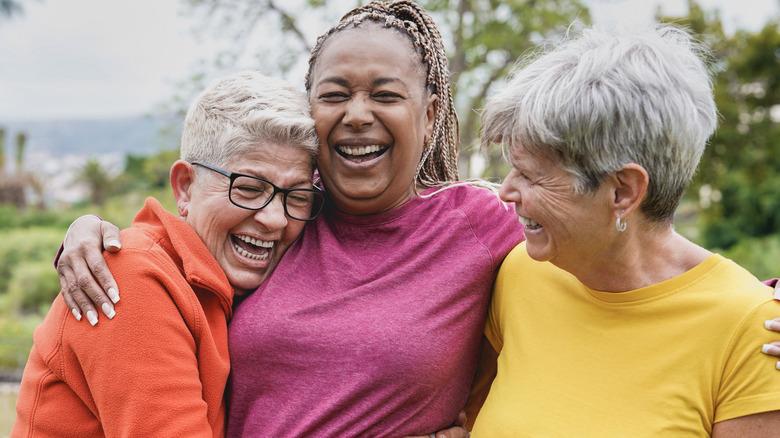Making Friends As An Adult Is Good For Our Health. Here's How To Do It
Just like a new habit, solidifying a new friendship takes time. Exactly how much time? According to communication-studies professor at the University of Kansas, Jeffrey A. Hall, it generally takes over 200 hours to build a close friendship from the ground up (via The Atlantic). Realistically, most of us don't have a spare 200 hours lying around. Many of us are juggling work, school, family, or everyday tasks like grocery shopping and laundry. Not to mention, getting enough sleep! As we move through different phases of our lives, our social circle may not be as large as it once was. While perfectly natural, here's how you can start adding a few more people to that circle if you're looking to expand it.
Science shows that friendships are good for our health. Some of these benefits include improved immune function, increased lifespan, less stress, and the ability to bounce back from illness more quickly, according to Verywell Mind. Experts say to reap these benefits, it all starts with an open mindset and a willingness to try new things.
Per Mindbodygreen, one of the best places to start when meeting new friends is to assess what interests you personally. "One of the easiest ways to connect with people who might be friendship material is to engage in group activities around your interests," psychologist Dr. Nicole Beurkens tells Mindbodygreen. By seeking out what fulfills us in life, we're likely to find people with similar interests, values, or passions.
Tips for initiating and maintaining new friendships
Are you an avid reader or writer? Consider looking into your local library for a book club or writer's meetup. Want to dive headfirst into something entirely new? Perhaps try a cooking course, an improv comedy class, or volunteering with a nonprofit!
In addition to seeking out new sources of friendship, don't forget to look around and see what opportunities may already be available to you such as co-workers, fellow gym-goers, friends on social media, or even your next-door neighbor (via Verywell Mind).
When it comes to making conversation, experts at Verywell Mind suggest asking questions about the other person and exploring their interests in addition to your own. When the conversation circles back to you, being open and honest is one of the best ways to establish a genuine connection. "We're programmed to be afraid of rejection, but no connections that are worthwhile happen without vulnerability," says somatic psychologist Dr. Holly Richmond to Mindbodygreen.
Nurturing a friendship is equally as important as initiating one. In addition to scheduling get-togethers, periodically checking in with a friendly text is a great way to stay in contact, even in the midst of a busy week, notes Verywell Mind.
Understandably, navigating new friendships as an adult can bring up feelings of anxiety. It can be helpful to remind ourselves that if someone accepts our coffee invite, it's because they're genuinely interested in getting to know more about us.


